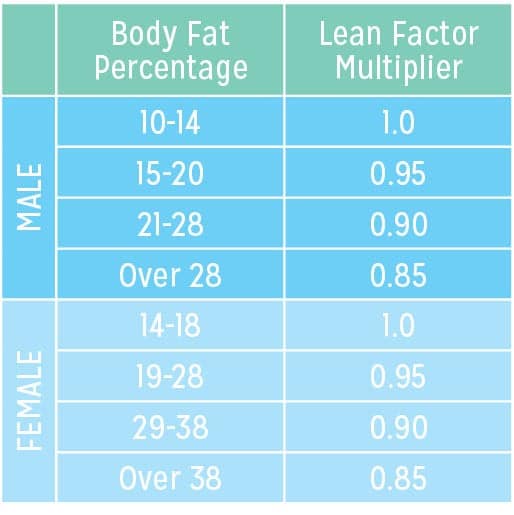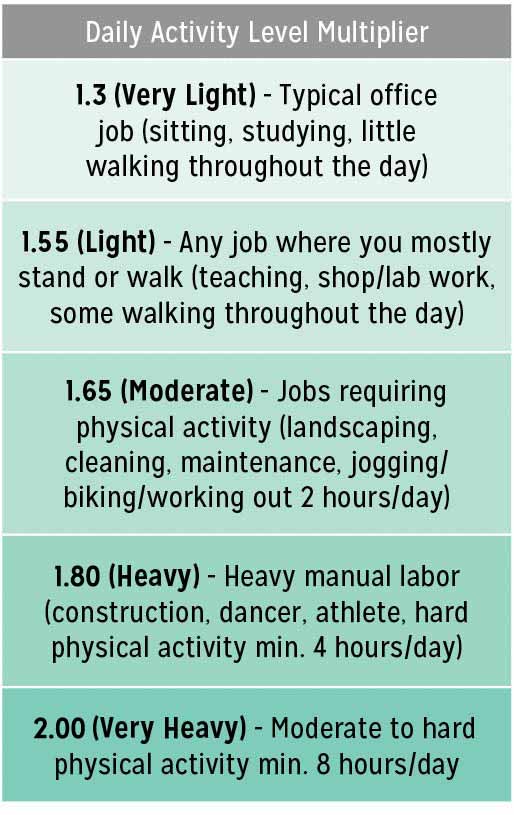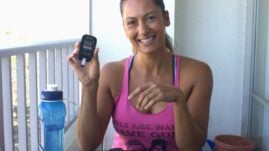This post may contain affiliate links. Please read our disclosure.
The cornerstone of any good fitness plan is getting your diet right, and to do that, the first thing you need to do is to determine what your daily calorie needs are.
There are a lot of different online calculators you can use to find out how many calories you should eat per day. Some of them are ok, but most calorie calculators oversimplify by only using your age, weight, and gender (and perhaps BMI).
If you are a fitness nerd like me, you will probably want to know the correct scientific way of calculating what your daily calorie needs are.
It’s a very easy 5-step process. I have used my own data in the example below to show you how I work out what my daily calorie needs are.

How to calculate your daily calorie needs
You can calculate your daily “maintenance calories” by following these easy steps:
Step 1: Find your current body weight in kilograms (if you live in the US, just divide your current weight in pounds by 2.2 to get your weight in kilograms).
Step 2: Multiply your weight in kilograms by 0.9 if you are a woman or 1.0 if you are a man.
Step 3: Multiply by 24
Step 4: Multiply by your “Lean Factor” from the table below (read on to learn how to find your body fat percentage if you don’t know it)

Example using my stats: 61 kg (134.5 lbs.) x 0.9 (female) x 24 x 0.95 (20% body fat) = 1252
This number is called your Basal Metabolic Rate (BMR). It’s how many calories you would burn in a day if you just lay on the couch all day and did nothing.
To find out how many calories you actually burn in a day, you need to multiply with your “Activity Modifier” from the table below.
Step 5: Multiply by Activity Modifier

My daily calorie need would be: 1252 (my BMR) x 1.55 (Light Activity) = 1940 calories/day
Important: No matter what this formula says, never eat less than 1,200 calories per day on average without consulting your medical team first. A very low daily calorie intake can lead to a slower metabolism, hormonal problems, and a number of other medical issues.
How to find your body fat percentage
As you can see, calculating your daily calorie needs is actually pretty simple, as long as you know your body fat percentage. Most gyms should be able to measure that for you, or a trainer can give you a very good estimate just by looking.
You can also use a tape measure and this online calculator to estimate your body fat percentage. It’s not as accurate, but you really only need an approximate number, so it should be good enough.
If you want a more accurate number (and to track any changes), you can invest in a scale that measures body fat percentage (you can buy the one I use HERE). It’s only $27.99 so it’s a worthwhile investment if you want to track your weight and body fat percentage.
How to decide your activity factor
The main mistake people make when using this calculation is to overestimate their physical activity level.
Even though I live a very active lifestyle and work out almost every day, I still only use the “Light Activity” multiplier. And that may even be on the high side because I also spend a lot (too much) time in front of a computer.
The higher multipliers are for people who use their bodies almost constantly throughout the day and therefore need a lot of energy, like construction workers, pro athletes, etc.
If you are pretty fit and active, you should probably use the “Light” or “Very Light” multiplier. If you are just starting a fitness program, use the “Very Light” multiplier.
Now that you know how many calories you burn in a day, the next step is to decide if you want to lose or gain weight.
How many calories should you eat to lose weight?
If you are trying to lose weight, I recommend eating around 400-500 calories less than you burn daily. That calorie deficit should lead to a weight loss of about 1 pound per week, which is a very healthy and sustainable weight loss.
I know it can be tempting to lower your daily calorie intake more if you are trying to lose weight, but it’s not a good idea. When you lose weight quickly by restricting your calories, you also lose muscle mass, and the weight you lose is much more likely to come right back (as fat) as soon as you stop dieting.
Instead, add more physical activity to your daily routine. Even just 15-30 minutes of light to moderate exercise such as walking can burn calories, increase your metabolism, and help you reach your goal weight.
To learn more about healthy calorie deficits, read our guide Can Eating Too Little Make You Gain Weight?
How many calories should you eat to gain weight (muscle)?
If you want to gain muscle, start out at 500 calories/day more than your maintenance calories and see what happens. If you find that you are also putting on a little too much fat, decrease your calories slightly.
Just like weight loss, healthy weight gain should happen slowly. If you want to gain weight and add muscle mass without adding (much) fat, focus on eating a healthy diet, incorporate exercise (and especially resistance training) into your daily routine, and aim for a caloric intake that’s only slightly higher than your maintenance calories.
How accurate is this formula?
While this calorie calculator is quite accurate for most people, it is based on an “average” person and therefore isn’t perfect for everyone.
It doesn’t take differences in natural metabolism into account, so if you have a particularly high or low metabolism (for example because of thyroid disease), the result from this formula won’t be accurate.
Because your natural metabolism declines as you age, the formula also tends to underestimate how many calories teenagers need and overestimate the daily calorie requirements for people older than 60.
It’s also the most accurate for people who are close to the “average weight”. If the result of your calculation is that you need less than 1,400 daily calories or more than 2,500 daily calories to maintain your current weight, then it’s recommended that you talk to your doctor or dietitian before making any changes to your diet.
Frequently asked questions
There are roughly 3,500 calories in 1 pound of body fat. This means that, in principle, you will lose 1 pound per week with a calorie deficit of 500 calories/day (3,500 calories/week).
In reality, weight reduction is often a little slower than this as your body adjusts dynamically to any calorie reductions by lowering your metabolism.
It can be very hard to know how much you are actually eating without counting calories. Research shows that people eating in fast-food restaurants underestimate how many calories are in their meal by up to 500 calories.
You can use apps such as MyFitnessPal or Lifesum to track your daily calorie intake (and daily activity).
To ensure you reach your daily calorie targets, it’s also a good idea to follow a meal plan. You can either create your own or simply pick one from my meal plan library.





Ashley Magnan
I’m 5’6 and I weight 180 I gained a ton of weight and I’m trying to lose it the healthiest way possible but I’m not sure on how much calories I intake and how much to take from it
Christel Oerum
One way could be to write down what you’re currently eating, and if your weight is stable, use that as your calorie baseline. You can then cut down from there or add more activity to your daily routine
Judith
Hi, I tried using your calculator. My wt is 84 kgsx 0.9×24=1814.4. What would be my lean factor? Is something wrong in this calculation?
Christel Oerum
If you can’t estimate your lean factor you can scroll down and use the resources to find your bodyfat percentage
Catherine
Hi
I am 57yo and can’t seem to lose the excess and over past year have gained 13 pounds despite continued effort to lose? Can’t seem to crack the new code and also have new continuous GI bloat that is relentless despite multiple diet change? Please advise…
Christel Oerum
You might benefit from seeing a registered dietitian who understands diabetes. As we get older weight loss can become more challenging, but it could also be a good idea to ask your doctor to check and monitor your hormone levels
Muskan Garg
Hi Christel, thanks for the info. Apparently, according to this calculator my daily calorie need is 1271. I am a 23 year old skinny girl. I want to gain weight but find it hard to eat much. Can you direct me to the right resources? Thanks!
Christel Oerum
That does sound like not enough calories for an adult.
Ideally, you’d want to work with an RD (Registered Dietitian) to establish the best nutrition for you, most generic sites will just tell you to eat larger quantities and stop there. Some RDs take insurance so that might make it a little more attainable. I recommend reaching out to an RD group such as Your Diabetes Insider (https://www.yourdiabetesinsider.com/) or you can ask your primary care doctor for a referral